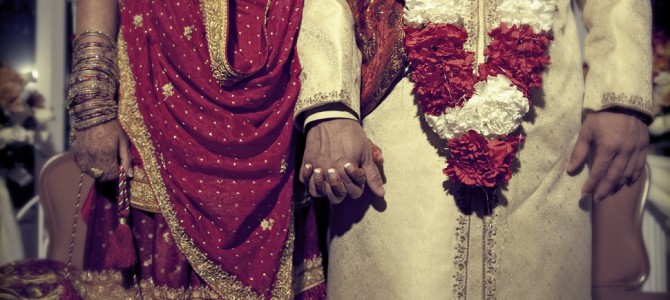
Americans are generally people of goodwill who try to keep the golden rule. I think that’s why the term “equality” has such resonance for so many of us. But as we move farther down the path called “marriage equality,” I believe a greater dose of skepticism is in order by all freedom-loving Americans, whatever their perspective on the issue.
That’s because one particular cross-current rooted in the same-sex marriage movement promises to dominate the aftermath, shift us all away from the idea of freedom to marry, and place us all into system more akin to hard left central planning. It’s a little movement that goes by the moniker “singles’ rights” or sometimes “unmarried equality.”
Let’s not fall into a trap here. We need to think this through.
The Confession
I recently argued in The Federalist that same-sex marriage is merely a vehicle to abolish all civil marriage, and with it, all family autonomy. I predicted that “singles’ activists” would try to finish the job by using those same “marriage equality” arguments to claim that all civil discriminates against singles and therefore should be abolished. Lo and behold, a singles’ activist, author of the book “Singlism,” and blogger for Psychology Today, Bella DePaulo, confirmed exactly that in her critique of my Federalist article, “Welcome to Selfie Nation.” Here’s what she said: “Morabito says that what I really want is ‘to abolish marriage without saying so.’ That’s not quite right. I’m happy to say so.”
DePaulo seems to have hedged on this before, not going so far as to say outright that civil marriage should be abolished. Instead, in 2012 she picked up on Elizabeth Blake’s argument that marriage should be “minimized.” But perhaps with the Supreme Court’s recent decision to expand same-sex marriage, that façade doesn’t seem to need so much propping up any more. So DePaulo is “happy to” fess up now and say, yes, her movement definitely wants all marriage abolished.
As for me connecting “singles’ rights” with the same-sex marriage movement, DePaulo had this to say by way of confirmation:
The author picks up on an argument I have been making for some time – that single people are targets of institutionalized, legalized discrimination in the form of the 1,000+ federal laws that protect and benefit only those who are legally married. She also accurately notes that my argument, and that of many other like-minded critics, has roots in the same-sex marriage movement.
It’s a significant admission. So marriage supporters and activists out there, could you please take note and pursue this line? If a little coterie of activists who claim to speak for all singles gets its way, the Supreme Court may soon consider declaring all marriage unconstitutional.
That is the whole point of same-sex marriage, at least as far as such singles’ activists–and likely most LGBT activists—are concerned: to lay the groundwork for abolishing it altogether. And with it, all family autonomy and family privacy will have to go. Whether you are a left-wing true believer in central planning and control, someone who has accepted the mantra of “marriage equality” for same -marriage, or someone who has accepted the final step of this strange journey—that married “privilege” should be abolished—the path will be set and the outcome will be the same.
Let’s Clarify Reality
The arguments I make for marriage and family are straightforward, even plain. Central planners have always understood that when you legally isolate people, you can better control them. Take away the sanctuaries of marriage and family, and you take away everybody’s privacy and autonomy. The state zooms into that vacuum.
Now, I do understand that DePaulo is deeply invested in her quest to abolish marriage in the guise of singles’ rights. So I imagine that’s why she did not respond to my central argument that it is bad for the state to completely disregard family bonds, and thereby legally isolate each and every individual, single and married alike, from the autonomous sanctuary of families.
Instead, DePaulo sums up her response to me in a very strange way: by claiming I am “afraid” of single people. Whenever a critic has to resort to an ad hominem fallacy—especially such a ridiculously offbeat one—well, you know you’re definitely on to something. At first, I thought it was kind of funny, even if outlandish. I mean, telling someone they’re “afraid of single people” is like telling them they’re afraid of people with arms or people who walk. It’s an eye-roller, a silly charge to respond to.
Nevertheless, it’s always disturbing to see someone project emotions onto the messenger of an intellectual argument rather than just answer the points. And who exactly are these “single people” of DePaulo’s imagination? I see us all as unique human beings, diverse in our perspectives. She sees “single people” as . . . . what? A monolithic political bloc, perhaps.
DePaulo’s apparent claim to speak for an entire demographic is another red flag. Recall, for example, how Lenin said he spoke for the proletariat, as their vanguard. Mao spoke for the peasantry, as their vanguard. And so on. Once you’ve wrapped yourself in the mantle of “the people” or “singles” or whomever, it is far too easy to lapse into accusing those who oppose your agenda of being against “the workers” or “the people” or “single people” or whomever. It is, in essence, a smear tactic that enables its users to avoid engaging with real arguments. And we all know it happens on every level: in middle school cafeterias, in homeowner’s associations, in office politics, in faculty lounges, in Politburos.
Abolishing Marriage Would Further Empower Central Planners
But the bottom line is that singles’ activists are poised to be handed the “marriage equality” baton by LGBT activists so they can use it to fight for “unmarried equality.” In the end, this basically means keeping singles single and making marrieds single, too.
Too many Americans seem hypnotized by the slogan that abolishing civil marriage will “get the state out of the marriage business.” No. It sure as heck won’t. Have you ever heard anyone who makes this claim explain exactly how it gets the state “out”? I haven’t, and I’ve concluded that’s because it does no such thing. Rather, by abolishing marriage, you simply give the state permission to refuse to recognize your marriage, and its attendant rights and responsibilities. This refusal inevitably extends to the rest of family relationships, including parent-child.
Thus, the effort to abolish marriage is intimately connected to the ongoing radical redefinition of family. All of this is about—whether consciously and willfully, or not—abolishing family autonomy, abolishing privacy, and, by logical extension, abolishing all personal relationships based on mutual trust. If there is no legally protected autonomy in the family, how can it exist in any other personal relationship? It can’t. By abolishing marriage, we all become strangers to one another in the eyes of the state. Statists have always salivated at the prospect of regulating all of our personal relationships, all of our social interactions. This is not good.
These Problems Aren’t Single People’s Fault
DePaulo goes on in her blog to mangle, distort, and misinterpret so much of my writing in so many ways that I cannot possibly address them all here. (But you can check my blog post here for more.) For example, I expressed concern about the breakdown of family bonds and how that affects social trust and a sense of community. She claimed this meant I thought “single people” were responsible for all of that. Are you kidding me? Singles aren’t a monolithic group even capable of such a thing. Maybe DePaulo thinks so. But I don’t.
My point about the breakdown of trust and community and family bonds is that it’s a vicious human cycle due to a complex array of factors and pressures. When human bonds weaken, so does trust. And when trust weakens, so do human bonds. There is a correlation between a growing sense of isolation and alienation in a society and the breakdown of bonds of personal and family intimacy. (But if I were forced to assign blame to any specific “group” of people I’d sooner consider married folks with kids who casually divorce than I would single people.) There are so many forces that separate people—coarse commercialism, economic pressures, status anxiety, the divorce culture, educational disparities, to name a very few.
Pious Baloney about Community Involvement
I must admit, I chuckled to see DePaulo’s channeling of Newt Gingrich at one point, when she called my connection of children to state interest in marriage “pious bologna” [sic]. I’ll raise her ten Newts on that. (Check my blog here for more.)
DePaulo carried on about “findings” (for which she provided no citations), that showed singles being far more community engaged than married people. While surveys do tend to show what you’d expect, that single people have more time for and thus engage in volunteering and other visible community activities, it’s also true that communities with higher numbers of married people as a whole have more civic engagement and economic mobility. And, obviously, married people keep themselves busy improving each other’s lives and the lives of their children, which doesn’t “count” as community involvement on some measures but clearly should.
Community is far more than what you see on the surface in public spaces. Even if DePaulo is correct to say that singles take more art and music classes, engage in more civic events, keep the cities more vibrant, or call their parents more often than marrieds do, I think we can explore issues of community engagement without pitting one group of people against another. I think it “counts” when married parents expend so much life-consuming energy on the raising of children. It “counts” when married people contribute energy to scout troops, kids’ sports leagues, school events, or churches.
Family Intimacy Breeds Trust
In the end, it helps to recognize that cultivating strong lifelong relationships, especially family intimacy, pays huge dividends for all of society. It breeds trust in others, and social trust has been plummeting over the past several decades, as the General Social Survey recently noted.
DePaulo complains that married people are “insular.” Perhaps what she means in part is that they are intimate, and therefore not as attentive to the community activities she’d like to see them more engaged in. Intimacy does, by definition, require a certain degree of privacy and prioritizing for relationships to grow and develop. But intimacy breeds trust, and that’s ultimately good for communities.
The healthy intimacy within families—with or without children—begets trust, security, and well-being. Organic marriage serves as the most reliable forge for such things, especially because it’s within that relationship that future citizens most readily come into being. It’s in that context that citizens (while they are young) are most able to feel a level of unobstructed commitment and intimacy as nothing else in the public or private sphere can give them. With the stability and trust imbued in them, everybody benefits. So we need to recognize marriage, not obstruct it, because it keeps society healthy when that sense of goodwill and trust in people is then broadcast back out to the community by both married and single adults.
Follow Stella on Twitter. She blogs at stellamorabito.net.









